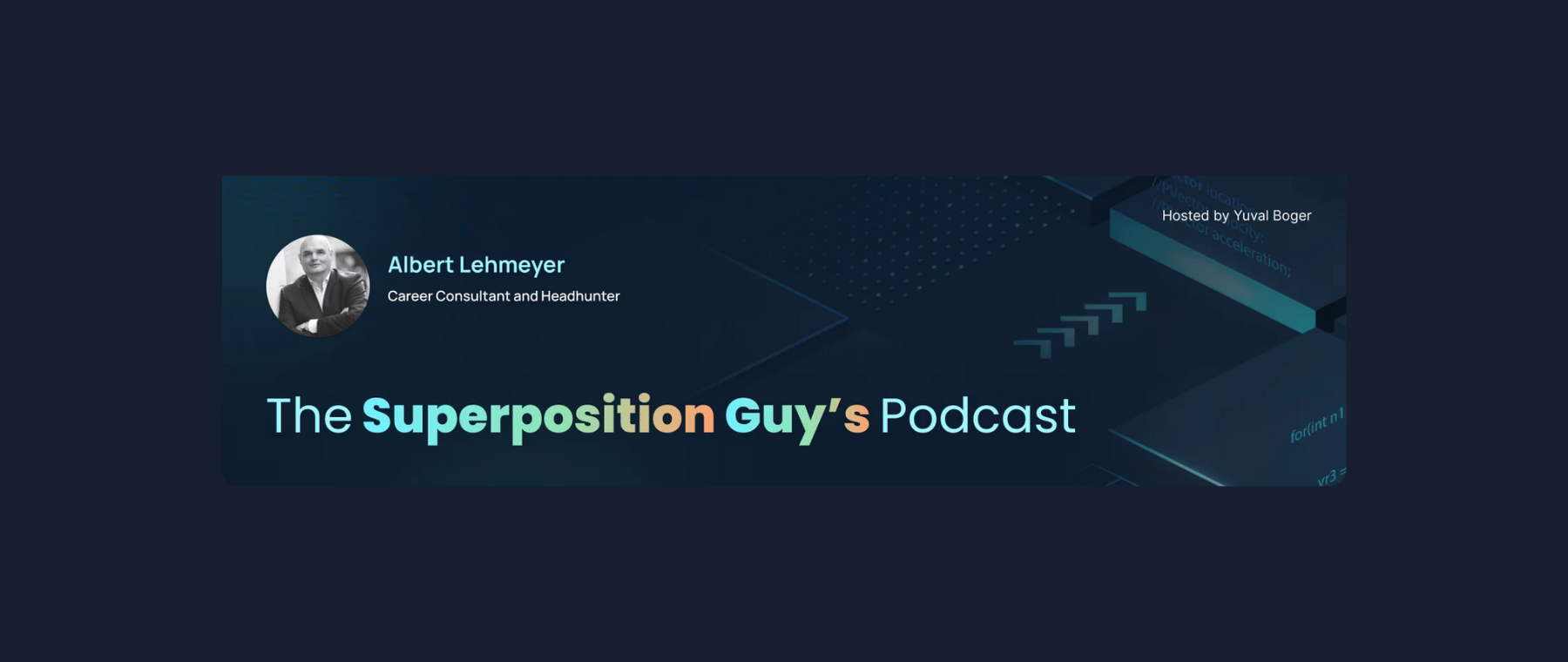“The Superposition Guy’s Podcast”, hosted by Yuval Boger, CMO at QuEra Computing
Albert Lehmeyer, a career consultant and headhunter, is interviewed by Yuval Boger. They discuss the increasing competition for quantum talent, the geopolitical challenges affecting workforce development, and the need for more quantum awareness and education. They also discuss the salary gap between quantum and AI, advice on university education for quantum careers, the growing demand for quantum computer operators, and much more.
Listen on Spotify — here
Full Transcript
Yuval: Hello Albert, and thank you for joining me today.

Albert: Hello Yuval, thanks for having me.
Yuval: Of course. So who are you and what do you do?
Albert: My name is Albert. I’m from the origin a PhD physicist with a profound experience in, let’s say, management jobs along the value chain, starting an R&D after my PhD and then finalizing at high-tech sales. After that, I have been concentrating more and more on freelancing marketing and technology consulting, dealing especially with small and medium companies in Europe. And let’s say in the beginning of 2010, I discovered my passion for being a career consultant and headhunter in the, let’s say, STEM segments, science, technology, engineering and math,, as you know. Because coming back to my education then, on the other hand, it is a little bit of an advantage to be a physicist,too, and to speak with people that rely on you. And I’m dealing with quantum and quantum technology, let’s say, since three or four years, more and more concentrating on this wonderful development we can see in the moment.
Yuval: And you’re focused on workforce development, right?
Albert: Yes. My focus is mainly workforce, coming from more than, let’s say, candidate orientation and career coaching. Of course, I have to concede that I’m a headhunter! But the first step is always to get in touch with talented and highly motivated, let’s say, quantum people that want to discuss with me because they want to find a new job option. And what I try to do, I’ve seen perhaps my focus on LinkedIn, that I’ve tried to evaluate the different qubit methods are to be seen and to get in touch with people dealing with the different methods to come to the point. I have to drink a little bit of water. Sorry. Nobody knows how the race will be finalized. And therefore, I think about sometimes in terms of investment people, on the other hand, what is the view of, let’s say, a talented candidate finishing his master’s orPhD degree? Should they concentrate on one method or should one be more methodically open because nobody knows how the race will be finishing?
Yuval: What’s new in workforce development? How has the workforce development field for quantum changed, say, over three years or so since you started engaging in quantum?
Albert: I can tell you because I’ve had many, many interviews with candidates, but with hiring managers too, that the competition has been increasing. And one aspect I would like to mention, as you know, we have a very different, complicated, let’s say, to be modest geopolitical arrangement in the moment, leading unfortunately to many people that are on the way or refugees. And therefore, we have stronger competition and we have some, let’s say, political blocks that is not making this job easier, but on the other hand, could be opening doors for people to come to Europe, especially to the US, because I’m even dealing to be open with, I cannot mention names, because as a headhunter, you work behind the curtain with people that are flying in the moment from Russia, for instance, or have been flying or already in Cyprus. And I’m dealing with quantum people that want to get out of Teheran, for instance, just to give you a feeling because the competition is huge. And now we have this unexpected geopolitical problems that is not making this stuff easier. One thing I should mention, I have a wonderful discussion with Nico Mohr from McKinsey. The next quantum monitor report, so-called, let’s say, quantum bible, will be published in the end of this month and we will have some new numbers on the so-called talent gap. And to finalize my thought, if we do and deal with quantum workforce, we have to create more quantum, let’s say, awareness and quantum education, too. I’ve been observing that many master programs and even PhD programs are set up now in the US, in Canada, in Germany, in Switzerland, and this is leading to a better filling grade of the pipeline. But on the other hand, what I sometimes miss is a clearer, let’s say, evaluation of the numbers. And therefore, I’m struggling in discussion with Nico, for instance. Why not making a so-called talent mapping?? But because I’m a fan of research, as you can imagine, and if you find the right meta-search terms in these, then you will find a solution that is showing more quantitative numbers, as I’ve seen to know. From my point of view, I have no problem to get in touch with many, many people that are trying to contact me because I’m rather visible on LinkedIn. But on the other hand, there is perhaps a problem in evaluating the different qubit methods. And should we concentrate on one method or should one be, let’s say, technology-open? Then you come from the use case and from the application, and then perhaps you don’t want to make a decision in the moment to, let’s say, neutral atoms as QuEra ( as your company) or perhaps ion trapping or something. It’s very difficult to answer all these aspects in one or two sentences.
Yuval: Where do you feel is the biggest gap? Is it in physicists developing particular technologies? Is it in business translators that can understand the business and translate it into technical terms? Is it software engineers? Where do you see the biggest gap today?
Albert: That’s a good question. Sometimes I could remark in some companies I’m working for are too many physicists in it. Therefore, it should be very sensible to bring, let’s say, use case developers on the table or people coming from more computer science and applied math. But on the other hand, I’m working for, to give you an example, you can see it openly,. therefore, I can name the name eleQtron, a very promising startup in Germany. So you have a combination of, let’s say, physicists, on the other hand, people are very experienced business developers from, let’s say, old school in the positive sense, high-tech industries. Bringing these people together will be solving the problems because I’m a fan. It’s a bit complicated because I have a PhD in theoretical physics too when I’ve been younger. But on the other hand, you can see sometimes the question arises, well, who is making money already with quantum computing? Because I have been observing, let’s say, a bit of restructuring in some companies and setting even people free. But most of the talented candidates that are not only physicists will be finding new doors very soon because there is such a big hype already and we are no longer, as Niko Mohr mentioned a few days ago, in the so-called quantum winter, as I can imagine. Therefore, perhaps to come to the point, it should be a mixture! But we have not enough physicists to do it and sometimes it’s better to make a mixture in the management teams that you have another characters than you would have in the department of a new university, that’s a too physical university.
Yuval: When you look at national quantum programs, they do identify workforce development as a big issue. Do you see one country or a couple of countries that you think are doing a better job that maybe should be used as an example for other countries on how to do workforce development right?
Albert: Yeah, I see some countries who are very keen on making a mixture of public and private partnership. One is perhaps Germany, we have a high talent density, as you might know, in Germany. But the government is the primary customer then. So, the German Aerospace Center was giving some money from the government. You can see wonderful programs in what was a bit surprising for me in Canada. There’s a huge development. You can see it in UK and of course in the US, too. What I see is that some people like to change, perhaps the company is not to be concentrated on one qubit method. Therefore, it’s very difficult, therefore I’m keen on to see what is standing in the next quantum report from McKinsey. There will be perhaps a counter report from Boston Consulting, then you have more numbers. We are only a small, let’s say, headhunting boutique. Therefore, I have not the need to evaluate all of this. But to come to the point, UK, Canada, Switzerland are very promising. And on the other hand, I’m German, as you know. We have lots of talents here and we have lots of universities that are making new, let’s say, master and PhD programs for quantum science, let’s say. Not only quantum computing, quantum sensing and so on. Because to get more stuff and more business development out of this, let’s say, quantum hype.
Yuval: When you look at software developers, they could do quantum. And maybe they could also go and work for an AI company. Do you see there is a big salary gap in favor of one versus the other? Do you see candidates that are considering which direction to go, quantum versus AI?
Albert: Yes, very good question. There is a bit of a salary gap when the companies I know are dealing more with artificial intelligence. Still paying already better salaries because they make profit already. Because they have used cases that are not so far away compared to quantum computing. But on the other hand, the companies that are supported by Google or IBM can be competitive. I have been speaking especially with physicists who made both decisions. And there are some companies already with, let’s say, one named Terra Quantum, I know the people quite well, who have a hybrid approach and try to combine, let’s say, quantum computing, quantum physics and AI. One other name is perhaps Alexandra Beckstein’s approach is called QAI Ventures , as you know. Because nobody knows how the boundaries are flowing in the moment. But I’m not able to tell you what, there is not a clear percentage in salary gaps. It is a decision of people that are passionate about what they strive for. That is perhaps my remark on your question. It’s a matter of the passion of a candidate.
Yuval: Imagine that you have a friend and the friend has a son and a daughter that want to go to university. They are inclined to work on exact sciences, maybe computer science, maybe physics. What is your advice? What should they learn to be best prepared to work in a quantum computing company?
Albert: A very good question. To give you an outline, I’m in wonderful contact with a 17-year-old guy who is, this question in the moment is 17, living in Prague, would like to go to ETH in Zurich or perhaps to your company or to the US. He’s dealing with physics, with math and with computer science, he’s not able to decide in the moment. And his parents are not professors in physics, they are lawyers. He asked me and I said, “Okay, make the mixture because look at everything.” To give you my outline, for me it was more important to be rather good in mathematics, to understand Schrodinger’s question and such things. Therefore, I would say why not taking more computer science in it or applied math because you are not able to understand the advantages that quantum computing will bring when you are not able to with linear algebra and Schroedinger’s equation and so on. But as you know, it’s always a matter of talent and passion. If somebody is dealing more with physics or experimental physics, I’m not so crazy to bring him on the other way. I love people that have clear imaginations and passion. Therefore, just a mixture. This question is not easy to answer as you might hear out of my perspective.
Yuval: In some areas, companies have their own training programs, whether for software engineers or other things. Do you see the same thing happening in quantum or is most of the training happens in universities and government-sponsored organizations?
Albert: In Europe, as I can see, most of the programs are given by universities or by state organizations. But I could mention one good example is IQM. You know them. They have a training academy as well to get in contact with talent. It’s a very good approach. And let’s say IBM is giving Qiskit courses. As you know, there are public and private approaches. And that is wonderful for young candidates because then they can make their own selection. The number of master programs is increasing at the moment. I don’t have exact numbers but Nico Mohr´s (McKinsey) report will answer that perhaps at the end of April.
Yuval: I could imagine that inside the EU, the European Union candidates come from many different countries. But do you see a lot of candidates that say come from the US to work in Europe or come from Singapore or the Far East to work in Europe? Or is it primarily EU candidates that move within the EU?
Albert: Let’s say 80 to 90% are European citizens. But on the other hand, we have Chinese PhD people in Germany. It’s perhaps a surprise for some countries. I’d rather open because of the geopolitical crisis we do have, it’s not so easy now if you decide as a Chinese guy to come here. I’m always a fan of single-case evaluation. And there is a huge, let’s say, international community. But the percentage could be 80, nearly Pareto distribution. But to be open, I have some approaches from candidates coming from Iran. They have decided to go out, to get out. It’s not easy to get out in these days as you can imagine, what has been of this terrible problem we have in the moment between Iran and Israel. You are coming from Israel, it seems to me!?. Therefore, I’m always a fan of single-case evaluation. If I can help somebody to get out of a non-democratic country, I really try to do my best, but it’s not easy. Therefore, I’m not able to give good numbers, but the numbers will be changing because of this. I have to repeat this because of the unhappy geopolitical situation we do have in the moment. For one final remark, I do know already some PhD people from the US that said to me, “If Trump is coming, we would go to Europe.” Then I said, “Okay, let’s wait, keep positive.” I do have candidates from Europe that want to go to the US, mainly from India, but on the other side of the Germans, why not? If you get the chance or a grant from MIT or let’s say Stanford or someone else, why not doing it? Most of the groups are rather international and that is rather motivating for me.
Yuval: As quantum computers are getting built and some companies are starting to deliver them, to install them on customer sites, do you see a growing demand for operators, for people who are able to operate a quantum computer, to service a quantum computer to keep it running, or is it still primarily scientists and engineers?
Albert: Good question. It should be a mixture of people who can build it. They come perhaps more from physics then. But on the other hand, there is a huge people gap in operating approaches. But there are wonderful companies already having defined this niche. One interesting company for me is Qedma, you know them perhaps, from Tel Aviv. They have the marketing slogan “quantum operating system” and educating such people. And more and more in Germany and in Europe, I see the trend that people are going more to, let’s say, computer science to be good operators. But the typical passionate experimental physicist wouldn’t do it perhaps, but he needs some support sometimes to get more operating standards in it. And it matters because, as you know, already I’ve been working in marketing and technology consulting. I’m a fan of minimizing the market risk. When you deal with only one qubit approach, you have a certain risk in it. You see it on my focus button on LinkedIn. They are competing qubit approaches to be seen and it might be that even a combination of these would be winning. I’m not sure at the moment, many experts, too. And I always try to get more out with so-called expert interviews. But nobody could give me a clear outline because the numbers are too small in the moment. You see it on LinkedIn on my focus button. There’s a nice plot from McKinsey, but the number of companies that have been asking the probabilities are only equal to 24. It has to be developed. And then we have more evidence in the next years.
Yuval: And as our conversation comes to a close today, I wanted to ask you a hypothetical question. If you could have dinner with one of the quantum greats dead or alive, who would that person be?
Albert: Very good question. I have had the chance to meet John Bardeen as a young PhD candidate. He alread passed away in 1991. He was so deeply motivating for me. John was one of the most motivating people I have ever met, this double Nobel Prize winner. And if I would have the chance to meet him again, he is in heaven now, I would ask him for a dinner conversation because I learned so much about Quantum Physics from John Bardeen! I will never forget him!
Yuval: Very good. Albert, thank you so much for joining me today.
Albert: Thanks for having me and thanks a lot for your interesting questions. It was nice. And let’s go on talking!
To subscribe to the audio podcast, please Spotify here
If you found this article to be informative, you can explore more current quantum news here, exclusives, interviews, and podcasts.



















